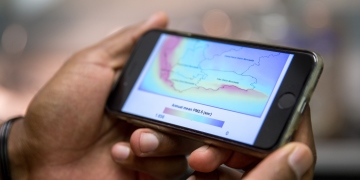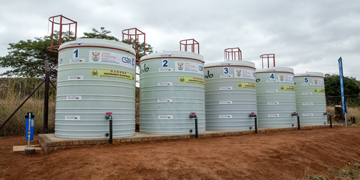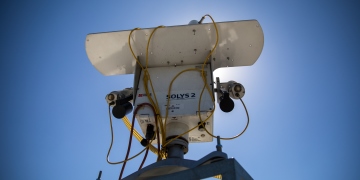SMART Places
The CSIR, with its rich multidisciplinary science, engineering and technology base – in climate change, environmental sciences, energy, water, building science, spatial planning and cleaner production – is ideally positioned to contribute to smarter places, including smart buildings, cities and regions, manufacturing, water use and energy use. Applying these skills to create truly smart places, would significantly improve the lives of South Africans.
Smart resource use: Smart interventions support prudent use of resources. The CSIR’s multidisciplinary capabilities are geared to strengthen resource efficiency and cleaner production for sustainable industrialisation. Industry decision-makers and policy makers will benefit from trade-off modelling capabilities and from CSIR skills in aspects relating to the circular economy – in which the maximum value is extracted from resources while maintaining harmony with the environment. These knowledge sets and associated tools are invaluable for decision support, notably for climate change mitigation and adaptation, and urban decision support.
Smart infrastructure (hard and soft): CSIR interventions include capacitating all spheres of government to improve all aspects relating to smart places – enabling smarter connected resources and infrastructure, and revolutionising the way of doing business and delivering services through, for example, new business models on eco-industrialisation.
Smart utility services: Smart places are also places with efficient utility services, such as electricity and water. As far as energy supply is concerned, the CSIR focuses on renewable energy – solar, wind, supply forecasting and thermal storage. Research and development in energy systems focuses on the anticipated challenges of introducing more renewables into the energy mix and improving the management of electricity demand during re-industrialisation. The CSIR also has strong knowledge sets on grid planning and energy demand. In terms of water, expertise extends to water and wastewater treatment technologies, real-time water management systems, water resource monitoring and water resource risk mitigation.
Spatial systems for smart places: CSIR programmes related to smart infrastructure include spatial planning systems, as well as advanced materials and processes. Relevant municipal programmes include science, engineering and technology solutions for infrastructure delivery, as well as capacity and capability-driven local economic development.
CSIR Smart Places seeks to improve the ease and effectiveness of doing business by:
- Lowering the cost of infrastructure and construction materials;
- Reducing the environmental footprint of socioeconomic activities, while mitigating and adapting to adverse effects associated with the use of natural resources;
- Supporting robust planning and policy settings; and
- Improving the availability and reducing the cost of water and energy (with the management and maintenance of infrastructure as minimum requirements).
The CSIR supports prudent resource-use through trade-off modelling, ensuring connectivity between resources, enabling industries that have a large economic impact and reach (such as health, education, transport, information and communications technology, electricity), and ensuring productivity and growth across multiple industries. Without enablers, the economy will have segmented players that operate independently and do not leverage each other’s strengths.
Other interventions include smart maintenance, which is seen as an imperative for sustaining public service offerings and will strengthen quality, performance and interactivity through information communications technology and innovation. The CSIR response covers the full value chain – from resources to services and utilities – and is predicated upon harnessing the opportunities afforded by transformative technologies to develop smarter resource use, infrastructure, and service developments directed towards enabling competitive socio-economic and industrial environments and sustainable natural ecosystems and economic growth.
These interventions are in response to the drivers outlined below.
- Unsustainable exploitation of natural resources and uncontrolled waste production, exacerbated by climate change, are threatening socio-ecological systems;
- Spatial inequality and uncoordinated urbanisation, as well as population growth, are constraining inclusive economic participation and equitable access to societal benefits;
- Deficient infrastructure is constraining socioeconomic advancement and service delivery;
- Inadequately integrated, evidence-based forward planning and ill-informed trade-off considerations are compromising effective decision-making and direction setting in socio-ecological systems;
- Resources and capability constraints are not conducive to competitive industrial development and sustainable growth.
The CSIR has set out to:
- Address the unsustainable use of natural resources and mitigate/adapt to the associated adverse effects;
- Support the transformation of built environments to ensure that citizens have equitable access to adequate human settlements, functional services and economic opportunities;
- Respond to infrastructure challenges in support of sustainable socioeconomic activity; and
- Support decision-makers with thought leadership, products and tools to foster robust planning and policy setting.
Impact areas:
Inclusive Smart Settlements and Regions: Focusing on research, development and innovation that generate evidence in support of policy, investment and planning decisions, to realise developmental goals in urban and rural settlements. It also supports, through applied research, the development of liveable, safe, resource-efficient, socially integrated and economically inclusive settlements that contribute to improving the quality of life of all residents.
Functional Building Infrastructure: Supporting contextually cognisant knowledge generation and application of science, technology and innovation in buildings, by leveraging multidisciplinary perspectives.
Sustainable Ecosystems: Focusing on identifying and addressing risks associated with a changing natural environment and the consumption of natural resources and seeking to provide science-based insights and solutions to environmental challenges.
Holistic Climate Change: Focusing on action to implement effective responses on climate change mitigation and adaptation by 2030 in South Africa and the rest of Africa.
Water Research Centre: Improving water resource resilience to ensure availability of quality water. The centre helps improve water management systems through contribution to policy review and development of tools and techniques that will reduce the cost of water delivery.
Energy Research Centre: Providing the scientific expertise and essential research infrastructure necessary to address South Africa’s growing energy needs. The centre provides thought leadership, innovation and capacity building to address the two main energy imperatives of energy-efficiency and cleaner energy.
Smart Places Hosted Programmes: Addressing priorities and needs through the packaging and implementation of integrated science, engineering and technology solutions in support of economic and industrial development through targeted implementation, quality relationships and partnerships with key stakeholders.
National Cleaner Production Centre, South Africa promotes the implementation of resource-efficient and cleaner-production methodologies to assist industry to lower costs through reduced energy, water and materials usage, and waste management.
National Foundry Technology Network supports the foundry (metal-casting) industry through focused interventions that are designed to improve foundry competitiveness, develop new technologies and products and support skills development in the sector.
Environmental Laboratories: Supporting national and industrial stakeholders with environmental and water quality management and assurance through impartial, independent, comprehensive and accredited analytical testing.










